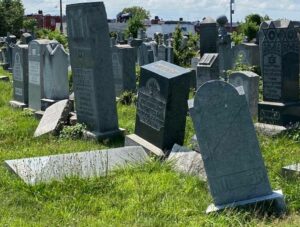
A simple, traditional Jewish funeral costs about $7,500-8,500, according to Joseph Levine & Sons Funeral Home partner Brian Levine. That’s with a plain, wooden casket and no limousines, flowers or death notice advertisements.
The burial and funeral process, a necessary part of the Jewish life cycle, is costly and, for the past 50 years in Philadelphia, the Jewish community has tried to lighten the burden for families who cannot afford it.
Today, the Dignified Burial Fund, run by the Female Hebrew Benevolent Society, is the foremost effort for the cause. The volunteer-led organization uses its emergency aid to assist in the burial of Jewish women and uses additional funding from the Jewish Family and Children’s Service of Greater Philadelphia’s critical needs fund to help friends to provide families in need with a modest Jewish funeral and burial. They use cemetery plots in Har Yehuda Cemetery, Har Nebo Cemetery, Montefiore Cemetery and six other area Jewish cemeteries, donated by families who do not need them. DBF also uses grant money from the Jewish Federation of Greater Philadelphia.
Since September, DBF has reviewed 26 cases and assisted in 22. In its first year in 2018, it reviewed 17 cases and assisted in 11.
Though in demand, DBF has changed hands multiple times since its creation. Many of the Jewish leaders involved in the project, as well as in cemetery maintenance and cleanup, have additional jobs and responsibilities. To ensure DBF and cemetery restoration efforts continue and have consistent financial support, the project should be institutionalized, argued Eileen Sklaroff, president emerita of FHBS and DBF co-founder. She has worked to create a nonprofit that would oversee these efforts.
“If we had this overarching nonprofit, then it would incorporate all functions that were related to death and dying. Burials and funerals would be under the auspices of this nonprofit entity,” Sklaroff said. “That would make sense to me.”
Though Sklaroff is leading these efforts in the hopes of institutionalizing DBF, she’s not the only one interested. Friends of Jewish Cemeteries, a project of the Jewish Federation, has also expressed interest in a nonprofit that would support the cause.
The Jewish Federation, which previously operated DBF and has organized community cemetery clean-ups, is looking into nonprofit models to steward these efforts. In iterations around the country, Jewish Federations have incubated these nonprofits, which then became independent entities.
As of this month, the Jewish Federation of Greater Philadelphia did not offer an update on the status of the nonprofit creation.
Sklaroff argues that a nonprofit would make the vetting and fund distribution process for DBF efficient and consistent.
She first came up with the idea for DBF in 2016, when the Jewish Federation and FHBS worked together to update a database of donated graves across various Jewish cemeteries. Working with Linda Roth from the Jewish Federation, Sklaroff cataloged the database, previously held by JFCS, which documented how and where cemetery plots were used. The Jewish Federation held the updated database.
Families of deceased relatives who no longer need space in a cemetery plot cannot sell back the land to cemeteries, but they can donate it, according to Levine. These plots are used for free or to subsidize burials for poor families. Before DBF, Levine & Sons, as well as other Jewish funeral homes, provided these services themselves, using money from JFCS, FHBS or the Fischer Memorial Burial Park.
“It’s an obligation that when needed or when called upon, we do what we can to help those who we need to help,” Levine said.
About 5% of the funerals Levine provides are free or subsidized, about one or two a month.
At the same time, Sklaroff began organizing meetings with leaders from Jewish Federation, JFCS and Jewish funeral homes, including Levine, on how to make the free and subsidized burial process more streamlined across the community.
Using the database, cemetery and funeral home owners, such as Levine, would have a standardized process to assist families in need. JFCS would conduct a needs assessment for families, and FHBS would identify costs and a burial plot.
Addie Lewis Klein, former senior director of community development at Jewish Federation, gave $10,000 in seed money to the cause, which then became DBF.
“When there are living people with unmet needs, it is sometimes hard to prioritize providing a dignified burial and caring for our cemeteries,” Klein said. “But I really think they are key parts of our legacy as a community and that we do have the responsibility to treat them as places of honor.”
When Klein left the Jewish Federation in 2022 to become the executive director of the Macks Center for Jewish Connections in Baltimore, DBF changed once more.
The Jewish Federation handed over DBF, and $20,000 in grant money, to JFCS to handle the project. Five months later, FHBS took over DBF, but JFCS still partners with FHBS and conducts the needs assessment for each case.
Though DBF continues to have a demand and operate successfully, there are still limited resources — both in people and monetarily — that prevents the project from having a greater impact, Sklaroff said, underlying the urgency of a nonprofit.
“I can’t see any organization in the community that will take this on,” she said. “It’s a huge amount of work.”





